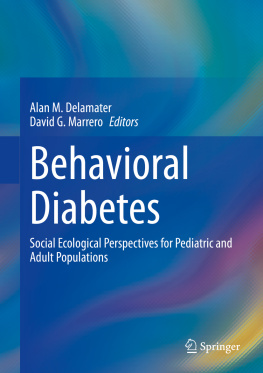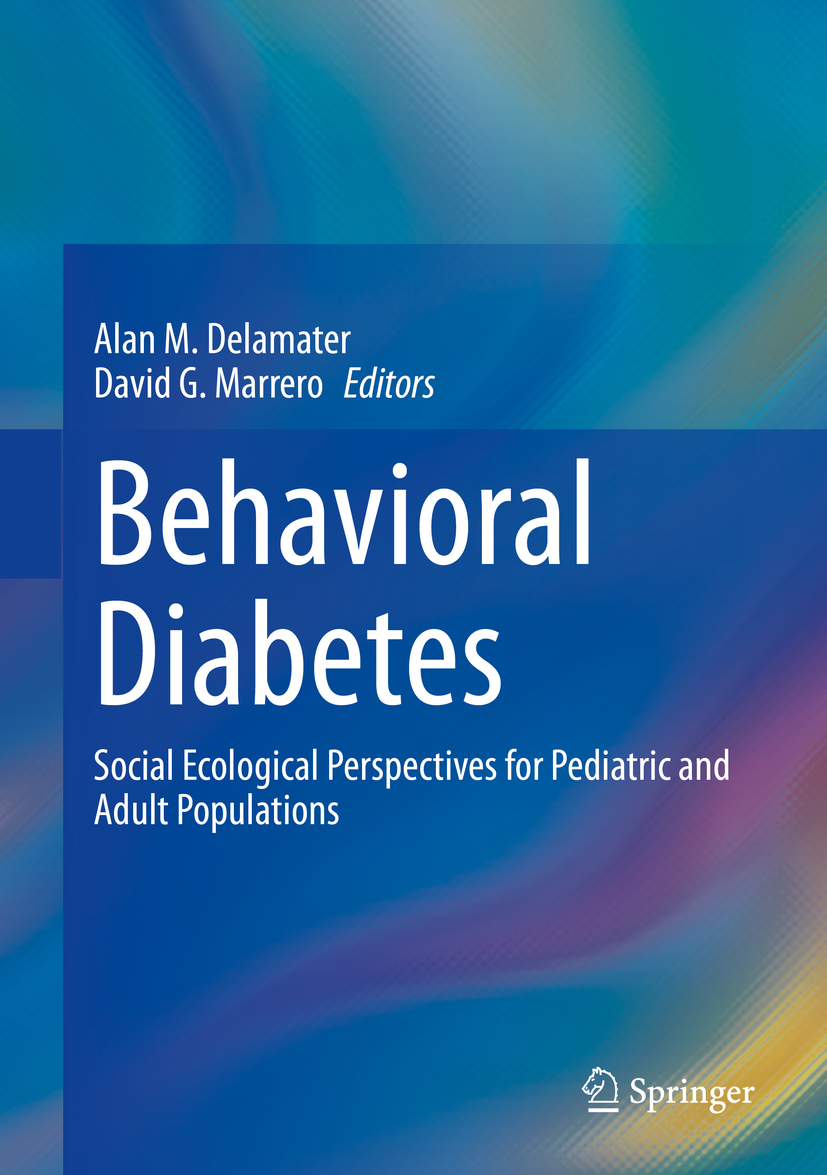Editors
Alan M. Delamater and David G. Marrero
Behavioral Diabetes
Social Ecological Perspectives for Pediatric and Adult Populations
Editors
Alan M. Delamater
Department of Pediatrics, University of Miami Miller School of Medicine, Miami, FL, USA
David G. Marrero
Center for Border Health Disparities, University of Arizona, Tuscon, AZ, USA
ISBN 978-3-030-33284-6 e-ISBN 978-3-030-33286-0
https://doi.org/10.1007/978-3-030-33286-0
Springer Nature Switzerland AG 2020
This work is subject to copyright. All rights are reserved by the Publisher, whether the whole or part of the material is concerned, specifically the rights of translation, reprinting, reuse of illustrations, recitation, broadcasting, reproduction on microfilms or in any other physical way, and transmission or information storage and retrieval, electronic adaptation, computer software, or by similar or dissimilar methodology now known or hereafter developed.
The use of general descriptive names, registered names, trademarks, service marks, etc. in this publication does not imply, even in the absence of a specific statement, that such names are exempt from the relevant protective laws and regulations and therefore free for general use.
The publisher, the authors, and the editors are safe to assume that the advice and information in this book are believed to be true and accurate at the date of publication. Neither the publisher nor the authors or the editors give a warranty, express or implied, with respect to the material contained herein or for any errors or omissions that may have been made. The publisher remains neutral with regard to jurisdictional claims in published maps and institutional affiliations.
This Springer imprint is published by the registered company Springer Nature Switzerland AG
The registered company address is: Gewerbestrasse 11, 6330 Cham, Switzerland
Spectacular contributions from leaders in the behavioral aspects of diabetes. This book is a must read for all clinicians taking care of patients with diabetes (children and adults). The authors have masterfully described how individual characteristics, in addition to the social, physical, and political environments in which behaviors occur, all influence management. In integrating the individual chapters, Drs. Delamater and Marrero highlight the role of behavioral interventions and demonstrate how such awareness is critical to achieving optimal diabetes outcomes.
Desmond Schatz
Professor of Pediatrics
University of Florida College of Medicine, Gainesville, FL, USA
This book, edited by Delamater and Marrero, is a comprehensive overview of the extremely important topic of behavioral diabetes. The issues encompassed in this book have evolved greatly over the last few decades, and the editors have done a spectacular job in having the key experts on each of the many topics review the literature while at the same time keeping it practical for both clinicians and researchers. Given the explosion of information on this topic dealing from pediatrics to geriatrics, this book should be present on the bookshelves of all interested in this topic.
Irl B. Hirsch
Professor of Medicine
University of Washington, Seattle, WA
Delamater and Marrero explore the expansive landscape of behavioral diabetes through a socioecological perspective to help us better design and evaluate strategies to address the overwhelming burden that diabetes can present to the patient and their families. As biomedical and bioengineering efforts have given us a plethora of new therapies to address glucose aberrations, it has become even more important that we must imbed these breakthroughs in a system of care and support that enables the patient and their loved ones to not only survive, but to thrive and achieve unencumbered by the stress, strain, discrimination, and imposed adversity often associated with managing diabetes. The chapters in this book are authored by experts in the field, representing a diversity of evidence and discussion that enable readers to truly explore their own thoughts and approaches. Behavioral Diabetes provides a wealth of information for both clinicians and researchers involved in the care of children, adolescents, and adults with diabetes.
Francine R. Kaufman
Chief Medical Officer, Senseonics
Distinguished Professor Emerita of Pediatrics at USC
The Center for Endocrinology, Diabetes & Metabolism
Childrens Hospital Los Angeles
We dedicate this book to the memory of Julio Santiago, MD, and Richard Rubin, PhD, two friends and colleagues who helped to support and energize the field of behavioral diabetes. This book is also dedicated to the new generation of researchers who are continuing to advance the field.
Foreword
I am often presumed to be a psychologist as well as a physician, since I am a Professor of Medicine, Pediatrics, and Psychology. That is not the case. My focus is on diabetes, from cradle to grave hence appointments in both Medicine and Pediatrics. However, long ago, I realized that the most difficult aspect of diabetes management was dealing with the psychological aspects and that if there was to be meticulous glycemic control, one must understand the various stressors in the life of the patient and the family. That led to two things: first, having behaviorally oriented people on our diabetes management team, and, second, exploring research questions that included the interaction of psychosocial and behavioral support in improving the care of type 1 diabetes. I ended up with an appointment in psychology in order to serve on advisory and dissertation committees of the many psychology students who worked in our unit.
Alas, I was short-sighted. In this book, Delamater and Marrero have expanded the notion to include not just the patient and family and their biological and psychological issues. They have developed and explored an ecological model of health behavior that includes the communities, organizations, and culture in which the patient and family live. And they go further in noting that all of this is influenced by society in general, including government policies.
Over the past few years, we have become accustomed to reading tragic stories of patients with type 1 diabetes having to ration their insulin and dying as a result of not having affordable insulin as an option. Thinking about this in the context of the broad ecosystem highlights how multiple issues at all levels impact the lives of patients.
This book is a unique contribution to the field it is the first time in one volume that all levels of the social ecological model are comprehensively discussed in relation to diabetes management with an emphasis also on the different issues in pediatric and adult populations. The editors have assembled an impressive array of international experts who collectively have tackled the various components of the ecosystems impacting diabetes management. Moreover, the editors made a conscious effort to encourage senior authors to work with junior colleagues in constructing their chapters. Not only did this bring contemporary concepts to the table, it also allowed the next generation of diabetes clinician investigators to better appreciate the complexities of dealing with the ecosystem impacting diabetes.











